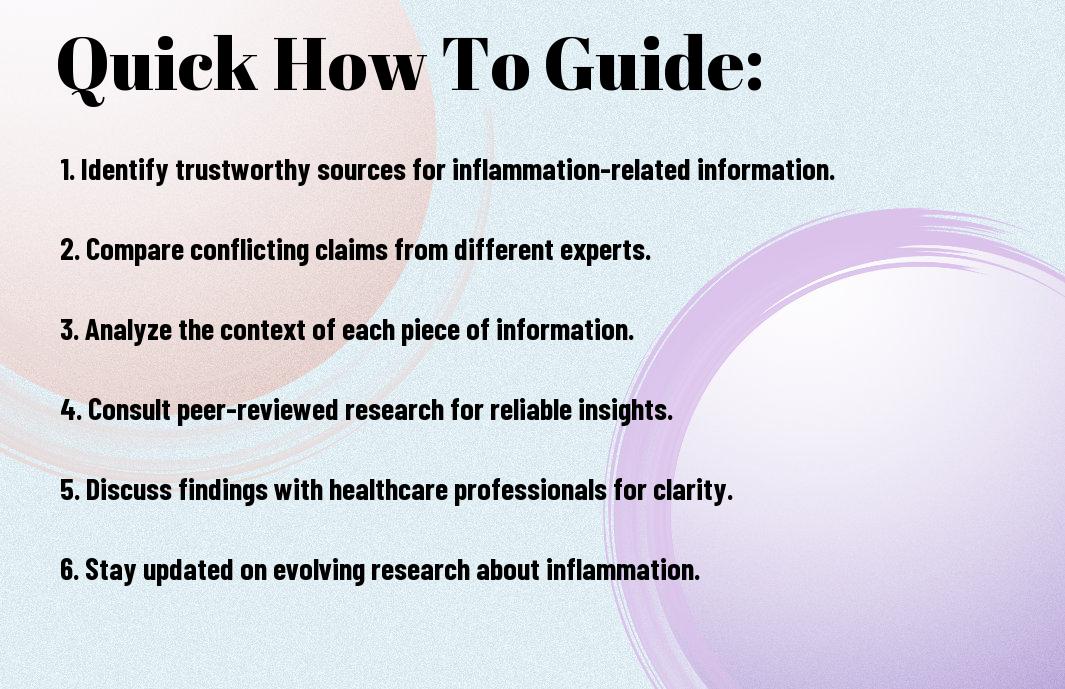As you explore into the world of health and wellness, you’ll likely encounter conflicting information about inflammation. With so many misleading sources, it can be overwhelming to discern fact from fiction. You may be unsure about what to believe, and this confusion can be detrimental to your health. However, by learning how to effectively evaluate information, you can make informed decisions about your well-being and take control of your health, reducing your risk of chronic diseases and improving your overall quality of life.

Key Takeaways:
To navigate the complex landscape of information about inflammation, consider the following points:
- Understanding the Root Causes of inflammation is crucial to developing an effective strategy for management. This involves identifying the underlying factors contributing to inflammation in your body.
- Dietary Choices play a significant role in either promoting or reducing inflammation. Foods high in Omega-3 Fatty Acids, antioxidants, and fiber can help mitigate inflammation, while a diet rich in Processed Foods and sugars can exacerbate it.
- Staying Physically Active is a key component of an anti-inflammatory lifestyle. Regular Exercise has been shown to reduce systemic inflammation and improve overall health outcomes.
- The Microbiome has a significant impact on inflammation levels in the body. Maintaining a healthy balance of gut bacteria through Probiotics and a balanced diet can help reduce inflammation.
- Being aware of Environmental Toxins and minimizing exposure to them is vital. Certain Chemicals and Pollutants can induce or worsen inflammatory responses in the body, highlighting the need for a Sustainable Lifestyle.


Understanding Inflammation
The concept of inflammation is complex and multifaceted, and it’s necessary to grasp its basics to navigate the conflicting information surrounding it. You will encounter various definitions and explanations, but a thorough understanding of inflammation will help you make informed decisions about your health.
Defining Inflammation and Its Causes
You’ll find that inflammation is generally defined as a natural response of your body’s immune system to injury, infection, or damage. It’s a defense mechanism that helps your body heal and protect itself from harmful pathogens and foreign invaders.
The Role of Inflammation in the Body
If you consider the role of inflammation in your body, you’ll realize it plays a vital function in maintaining your overall health. Inflammation helps your body fight off infections, repair damaged tissues, and protect against chronic diseases.
Understanding the role of inflammation in your body is key to appreciating its positive effects. When inflammation occurs in response to an injury or infection, it triggers a series of events that help your body heal and recover. However, chronic inflammation can have devastating consequences, including increased risk of serious diseases such as heart disease, diabetes, and cancer. By grasping the complexities of inflammation, you can take steps to reduce your risk of these conditions and promote overall well-being.
Identifying Reliable Sources
Some of the most reliable sources of information on inflammation can be found in academic journals, such as Resolution of Inflammation: What Controls Its Onset? – PMC.
Tips for Evaluating Online Information
On evaluating online information, you should look for credible sources and peer-reviewed articles. Here are some tips:
- Check the author’s credentials
- Look for references to support claims
. After verifying the sources, you can make informed decisions about your health.
Factors to Consider When Assessing Scientific Research
Assessing the methodology and sample size is imperative when evaluating scientific research. Here are some factors to consider:
- Study design
- Data analysis
. Knowing these factors will help you make informed decisions about the validity of the research.
It is also imperative to consider the funding sources and potential biases in the research. Here are some additional factors to consider:
- Conflict of interest
- Publishing journal
. Knowing these factors will help you evaluate the reliability of the research and make informed decisions about your health, which can help you avoid misinformation and dangerous treatments, and instead, find effective and safe solutions.
How to Separate Fact from Fiction
Keep in mind that navigating conflicting information about inflammation requires a discerning approach. You can find more information on Understanding Responses to Different Types of Conflicting Information to help you make informed decisions.
Analyzing Study Design and Methodology
On closer examination, you’ll notice that the quality of a study’s design and methodology can greatly impact its findings, and flaws in these areas can lead to misleading conclusions. You should carefully evaluate the study’s design, sample size, and methods to determine its validity.
Recognizing Bias and Conflicts of Interest
Some studies may be influenced by hidden agendas or financial interests, which can affect the outcome. You need to be aware of these potential biases and consider multiple sources before forming an opinion.
Analyzing the funding sources, author affiliations, and potential conflicts of interest can help you identify biases. Be cautious of studies with undisclosed funding sources or authors with ties to industries that may benefit from the research findings. By being aware of these potential biases, you can make more informed decisions about the information you trust, and protect yourself from misinformation.

Evaluating Expert Opinions
Once again, you are faced with the challenge of deciphering conflicting information, this time from expert opinions on inflammation. You must carefully consider the sources and credentials of these experts to make informed decisions about your health.
How to Identify Credible Experts
Similarly, one way to determine the credibility of an expert is to look for peer-reviewed publications and academic affiliations, which can indicate a high level of expertise in the field of inflammation.
Considering Multiple Perspectives
Equally, expert opinions can vary greatly, and it’s up to you to weigh the pros and cons of each perspective, considering factors such as bias and conflicts of interest.
Considering the variety of expert opinions on inflammation, you should strive to stay open-minded and evaluate the evidence presented by each expert, taking into account the potential risks and benefits of each perspective, and being aware of the latest research and developments in the field, which can help you make informed decisions about your health.
Staying Up-to-Date with Current Research
Now, as you investigate into the world of inflammation, it’s necessary to stay informed about the latest developments. You can visit what is inflammation, its causes, effects, and treatment options to get a comprehensive understanding of the topic.
Following Reputable Health Organizations
One of the best ways to stay updated is by following reputable health organizations, which provide accurate and trustworthy information on inflammation, helping you make informed decisions about your health.
Setting Up Alerts for New Studies and Findings
Research on inflammation is constantly evolving, and setting up alerts for new studies and findings can help you stay ahead of the curve, allowing you to be aware of potential breakthroughs and avoid misinformation.
To set up alerts, you can use academic databases or online platforms that offer notification services for new publications on specific topics, including inflammation. This way, you’ll receive timely updates on the latest research, enabling you to make informed decisions about your health and stay safe from misleading information. By taking this step, you’ll be better equipped to navigate the complex world of inflammation and protect your well-being.
Making Informed Decisions
Despite the complexity of information, your understanding of inflammation is key to making informed decisions. You need to analyze reliable sources and consider your own health goals to determine the best approach for managing inflammation.
Weighing the Evidence and Drawing Conclusions
Even with conflicting information, you can make informed choices by evaluating the quality of evidence and considering your individual needs. You should prioritize trusted sources and be cautious of misleading information that may put your health at risk.
FAQ
Q: What is inflammation and why is it a controversial topic?
A: Inflammation is a natural response of the body’s immune system to injury, infection, or damage. However, it has become a controversial topic due to conflicting information about its role in various diseases. Some sources claim that chronic inflammation is the root cause of many diseases, such as arthritis, diabetes, and cancer, while others argue that it is a necessary response to maintain overall health. The controversy surrounding inflammation arises from the complexity of its mechanisms and the varying effects it can have on different individuals.
Q: How can I distinguish between reliable and unreliable sources of information about inflammation?
A: To navigate the conflicting information about inflammation, it is necessary to evaluate the credibility of sources. Look for peer-reviewed scientific articles, academic journals, and government websites, which are generally considered trustworthy. Be cautious of sources with biased or sensationalized language, as well as those that promote specific products or supplements. Additionally, check the qualifications and expertise of the authors and be aware of any potential conflicts of interest.
Q: What are the key factors that contribute to chronic inflammation, and how can I reduce my risk?
A: Several factors contribute to chronic inflammation, including a poor diet, lack of physical activity, stress, and environmental toxins. To reduce the risk of chronic inflammation, focus on maintaining a balanced diet rich in fruits, vegetables, and whole grains, and engage in regular exercise, such as walking or yoga. Also, practice stress-reducing techniques, like meditation or deep breathing, and limit exposure to environmental toxins by using non-toxic household cleaners and avoiding polluted areas.
Q: How can I separate fact from fiction when it comes to anti-inflammatory diets and supplements?
A: When evaluating anti-inflammatory diets and supplements, be aware of exaggerated claims and look for scientific evidence to support their effectiveness. Some diets, such as the Mediterranean diet, have been shown to have anti-inflammatory effects, while others, like diets high in processed foods and sugar, can promote inflammation. Similarly, certain supplements, like omega-3 fatty acids and turmeric, have anti-inflammatory properties, but their effectiveness can vary depending on the individual and the specific condition being treated. Always consult with a healthcare professional before starting any new diet or supplement regimen.
Q: What are the potential consequences of misinterpreting or ignoring information about inflammation, and how can I make informed decisions about my health?
A: Misinterpreting or ignoring information about inflammation can lead to delayed diagnosis, inadequate treatment, or unnecessary suffering from inflammation-related conditions. To make informed decisions about your health, stay up-to-date with the latest scientific research and consult with healthcare professionals who can provide personalized guidance. Additionally, be aware of your own body and take note of any changes or symptoms that may indicate inflammation, such as joint pain, fatigue, or digestive issues. By being proactive and informed, you can take control of your health and make informed decisions to reduce your risk of chronic inflammation and promote overall well-being.



